I am part of the multidisciplinary research group, Psycho-Social Ethnography of the Commonplace (P-SEC), led by Drs. Carmen Poulin and Lynne Gouliquer, that is currently carrying out a pan-Canadian study to document the experiences of serving 2SLGBTQIA+ CAF members and their partners. This is the context for my involvement in examining the contemporary experiences of trans soldiers, more than 30 years after the end of the Purge. In collaboration with my co-supervisors Drs. Poulin and Gouliquer, I examined interviews of trans military personnel in the CAF. This has led to my deeper understanding of CAF policies and politics affecting this group of CAF members and facilitated my connections to scholars and military personnel across Canada. The research experience has advanced my knowledge of and exposure to qualitative interdisciplinary research, relevant to my training as an applied psychologist.
For me, being involved in this study on trans CAF members is both challenging—as CAF regulations are constantly changing—and fascinating. I have had the opportunity to analyse interviews conducted with trans military members and to see the impact of (changing) policies on their day-to-day experiences. I also reviewed numerous CAF institutional healthcare policies, such as all publicly available information about the CAF Spectrum of Care. The trans CAF members’ stories reveal not only their challenges related to healthcare, but also their coping strategies. Together, this information can be used to generate ideas for sociopolitical change.
Thus far, the study has revealed several insights. Participants discussed how the military healthcare system allows for people to access gender-affirming care, but many procedures (e.g., voice therapy or laser hair removal) are not covered under the CAF healthcare policy because they are categorised as cosmetic. Additionally, trans people often do not get the necessary sick leave to undergo surgeries and adequate recovery time post surgery. Trans people struggle to secure referrals from military medical personnel for specialists outside the CAF because they are required to obtain care from CAF medical professionals first. These referrals are time-intensive and, if sought outside the CAF, cost-intensive for many trans people. In addition, the unwillingness of some doctors to support trans patients aggravates the situation. The participants’ experiences highlight that trans people struggle to obtain gender affirming care. As a result, the CAF fails to recognise the multitude of trans experiences, as the CAF strives for a one-size-fits-all approach to transitioning.
Participants have coped by finding support in groups or online networks of other CAF trans people: they supported each other via information sharing and through activism (e.g., engagement in trans positive spaces). Many participants have become outspoken advocates for trans healthcare and are working tirelessly to educate the CAF and the public.
Taken together, the results suggest that more inclusive military practices (e.g., the inclusion of trans people in policy making) and CAF policies (e.g., an up-to-date healthcare plan for the coverage of gender affirming care and change in sick leave rules) are necessary. Such changes represent a challenge to the military’s culture of universality and conformity because the current military medical model is underpinned by a traditional binary gender assumption and a pathologization of the trans experience.
Based on the accounts of the participants in this study, and the reports by the Honourable Louise Arbour (2022) and Marie Deschamps (2015), fundamental changes to CAF assumptions and practices are critical to provide a healthy sense of agency to diverse members, without placing the burden of change on their shoulders. Our timely and relevant findings coincide with some other current workplace initiatives aimed at creating a healthy and flexible environment to support a diverse and inclusive workforce. The active inclusion of trans individuals in the workforce has proven beneficial for both trans workers and their cisgender colleagues (Bozani et al., 2019; Huffman et al., 2021; Peate, 2020).
It is my hope that the insights provided by this research can help in the development of new practices, better informed policies, and more of an agentic and equitable response to the needs of trans CAF members. My vision is that such a transformation would lead to a better, more diverse, adapted, and flexible military overall.
References
Arbour, L. (2022). Report of the independent external comprehensive review of the Department of National Defence and the Canadian Armed Forces. Government of Canada, Department of National Defence. https://www.newswire.ca/news-releases/independent-external-comprehensive-review-into-harassment-and-sexual-misconduct-in-the-department-of-national-defence-and-the-canadian-armed-forces-853257606.html
Bozani, V., Drydakis, N., Sidiropoulou, K., Harvey, B., & Paraskevopoulou, A. (2019). Workplace positive actions, trans people’s self-esteem and human resources’ evaluations. International Journal of Manpower, 41(6), 809–831. https://doi.org/10.1108/IJM-03-2019-0153
Deschamps, M. (2015). External review into sexual misconduct and sexual harassment in the Canadian Armed Forces. https://www.canada.ca/en/department-national-defence/corporate/reports-publications/sexual-misbehaviour/external-review-2015.html
Gouliquer, L. (2000). Negotiating sexuality: Lesbians in the Canadian military. In B. Miedema, J. M. Stoppard, & V. Anderson (Eds.), Women’s bodies/women’s lives: Health, well-being and body image (pp. 254–276). Sumach Press.
Gouliquer, L., & Poulin, C. (2005). For better and for worse: Psychological demands and structural impacts on gay servicewomen in the military and their long-term partners. In D. Pawluch, W. Shaffir, & C. Miall (Eds.), Doing ethnography: Studying everyday life (pp. 323–335). Canadian Scholars’ Press. https://www.canadianscholars.ca/books/doing-ethnography
Gouliquer, L., Poulin, C., & Moore, J. (2018). A threat to Canadian national security: A lesbian soldier’s story. Qualitative Research in Psychology, 15(2–3), 323–335. https://doi.org/10.1080/14780887.2018.1430206
Government of Canada. (2023, December 5). Sexual misconduct in the Canadian Armed Forces, 2022. https://www150.statcan.gc.ca/n1/pub/85-603-x/85-603-x2023001-eng.htm
Huffman, A. H., Mills, M. J., Howes, S. S., & Albritton, M. D. (2021). Workplace support and affirming behaviors: Moving toward a transgender, gender diverse, and non-binary friendly workplace. International Journal of Transgender Health, 22(3), 225–242. https://doi.org/10.1080/26895269.2020.1861575
Okros, A., & Scott, D. (2015). Gender identity in the Canadian Forces: A review of possible impacts on operational effectiveness. Armed Forces & Society, 41(2), 243–256. https://doi.org/10.1177/0095327X14535371
Peate, I. (2020). Working towards the trans-inclusive workforce. British Journal of Healthcare Assistants, 14(1), 31–35. https://doi.org/10.12968/bjha.2020.14.1.31
Poulin, C. (2001). The military is the wife and I am the mistress: Partners of lesbians in the Canadian military. Atlantis: Critical Studies in Gender, Culture & Social Justice, 26(1), Article 1.
Poulin, C., & Gouliquer, L. (2012). Clandestine existences and secret research: Eliminating official discrimination in the Canadian military and going public in academia. Journal of Lesbian Studies, 16(1), 54–64. https://doi.org/10.1080/10894160.2011.557643
Poulin, C., Gouliquer, L., & McCutcheon, J. (2018). Violating gender norms in the Canadian military: The experiences of gay and lesbian soldiers. Sexuality Research & Social Policy: A Journal of the NSRC, 15(1), 60–73. https://doi.org/10.1007/s13178-017-0304-y
Poulin, C., Gouliquer, L., & Moore, J. (2009). Discharged for homosexuality from the Canadian military: Health implications for lesbians. Feminism & Psychology, 19(4), 496–516. https://doi.org/10.1177/0959353509342772

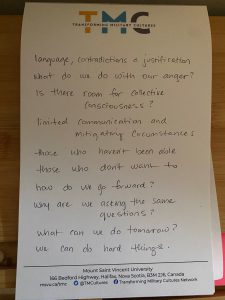 Poem shared by Ash Grover
Poem shared by Ash Grover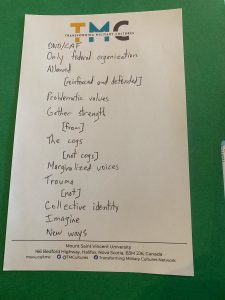 Poem shared by Nancy Taber
Poem shared by Nancy Taber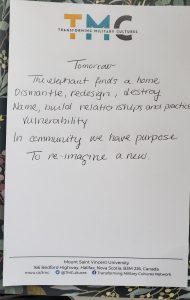 Poem shared by Tammy George
Poem shared by Tammy George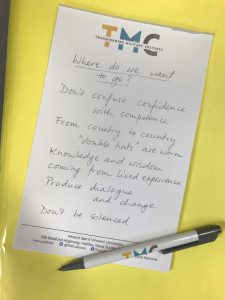 Poem shared by Maya Eichler
Poem shared by Maya Eichler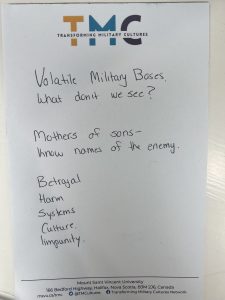 Poem shared by Sandra Biskupski-Mujanovic
Poem shared by Sandra Biskupski-Mujanovic